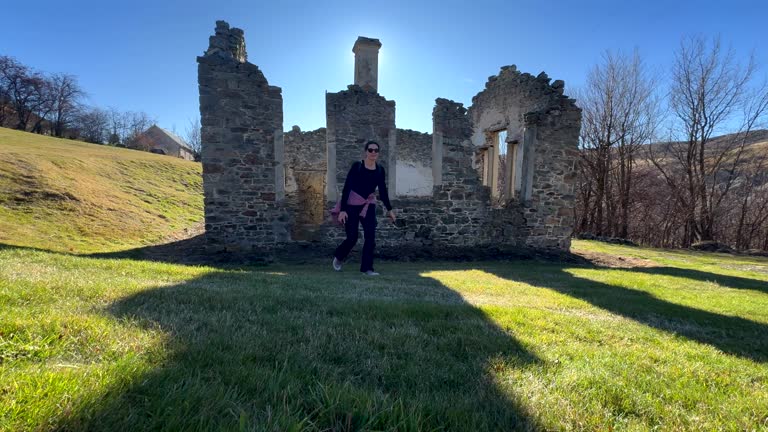
Discover the hidden stories of your town while enjoying a leisurely weekend stroll. Uncovering the past can be an enriching way to connect with your community and history.
Uncovering Hidden Stories in Your Own Backyard
There’s something magical about stepping outside on a quiet weekend morning, the sun gently rising, birds chirping, and the air crisp with possibility. Imagine adding a sense of adventure to your weekend walk by uncovering the hidden history of the places you walk by every day. Local history—often overlooked and underappreciated—can be one of the most enriching elements of your community, providing a unique window into the past while connecting you to the present.
As we go about our busy lives, we tend to overlook the little details around us—the plaques on old buildings, the faded markers on street corners, and the worn paths that have seen generations come and go. But if we pause and take a closer look, we realize that these seemingly mundane elements of our surroundings are actually part of a grand historical narrative, waiting to be rediscovered. Weekend walks provide the perfect opportunity to explore this local history and learn the forgotten stories of your town.
The Unexpected Treasures of Local Landmarks
Every neighborhood has its landmarks, some well-known and others hidden in plain sight. These landmarks often hold rich histories that can reveal fascinating insights about the past. From old brick buildings to monuments, parks, and streets, local landmarks act as silent witnesses to history.
Take, for example, an old church or a dilapidated factory building. What was their purpose when they were first built? Who worked there or gathered inside those walls? What stories have been lost with time? On a weekend walk, these questions arise naturally, sparking curiosity about the people and events that shaped your town.
Perhaps there’s an old stone bridge in your area, weathered by years of use. For years, it’s just been part of the landscape. But after a little research, you might discover that the bridge was once the primary crossing point for pioneers heading west or that it was the site of an important battle during a forgotten war. Suddenly, the bridge becomes more than just a structure—it’s a part of the collective memory of the community.
Making History Come Alive
What makes local history so exciting is that it is alive in the places we visit every day. Unlike the pages of history books, which often focus on distant events and famous figures, local history is something we can touch and feel in the present. The house at the corner may have once been home to a famous author, or the park bench by the lake could have been a favorite spot for political debates decades ago. Walking through the streets of your neighborhood becomes a way to travel back in time and imagine the lives that once played out there.
One of the best ways to experience this is to embark on guided walks or take part in local historical tours. Many towns and cities offer walking tours that highlight significant locations and reveal fascinating facts about the history behind them. If no tours are available, you can always create your own route by doing a little research beforehand. Websites, local libraries, and even word of mouth can lead you to the places that matter the most to your town’s history.
Taking a historical walk isn’t just about learning facts; it’s about immersing yourself in the stories and atmosphere of a bygone era. It’s about looking at the buildings and streets around you with fresh eyes, noticing the details that you never paid attention to before. With each step, the past begins to unfold, and the ordinary becomes extraordinary.
Connecting with Your Community’s Past
As you walk through your neighborhood, you’ll begin to realize how closely your personal story is intertwined with the stories of those who lived before you. Exploring local history allows you to better understand the people who shaped the community you live in today. Whether you’re strolling through the old district where your great-grandparents once lived or visiting a school that has been in the same family for generations, these walks bring a deeper sense of connection to the place you call home.
There’s also something special about learning the untold stories of everyday people. History books often focus on political leaders, wars, and famous events. But local history shines a light on the lives of ordinary people who contributed in their own ways. Perhaps a simple neighborhood pub was once the meeting place for suffragettes in your town, or a modest house once belonged to an immigrant who started a local business that still thrives today. These kinds of stories are easy to overlook, but they give depth and richness to our understanding of history.
Walking through these places, knowing the history behind them, can evoke a sense of pride and belonging. It can also ignite a desire to preserve and protect the spaces that have shaped the community’s identity over time.
History Beyond the Physical: Oral Traditions and Stories
Not all local history can be found in books or plaques. Much of it lives on in the stories passed down through generations. As you walk through familiar areas, take the time to chat with long-time residents or visit local historical societies that preserve the oral traditions of your community. These stories, often shared by those who have lived in the area the longest, provide a personal and intimate perspective on the past.
Oral histories bring the past to life in a way that written records sometimes can’t. They fill in the gaps, adding context, emotion, and personal anecdotes that make the history feel more real. Hearing someone recount how their family helped build a church or how they participated in a local protest decades ago can offer a deeper, more nuanced understanding of the town’s past.
During your weekend walks, make an effort to engage with the people who are connected to the places you visit. Ask them about their memories and experiences. You’ll be surprised by how many people are eager to share the history they hold dear. By gathering these personal stories, you add another layer of richness to your understanding of local history.
How to Begin Exploring Local History
Getting started on your local history exploration doesn’t require any special knowledge or skills. All you need is curiosity and a willingness to learn. Start by picking a few familiar spots in your neighborhood—perhaps a local park, an old building, or a quiet street—and see what you can uncover about their history. Many towns have historical markers or archives that can provide a wealth of information.
As you discover new stories, create your own history journal to record what you’ve learned. Take notes, sketch pictures of landmarks, or even snap photos of places that stand out to you. Over time, you’ll develop a deeper understanding of how your town has evolved and the people who have shaped it.
Conclusion: A Rewarding Weekend Ritual
Exploring local history on weekend walks is more than just an educational activity; it’s a way to develop a stronger connection to the place you live. Each walk brings new discoveries and a sense of wonder as you uncover stories that have been hidden in plain sight for years. Local history offers a unique perspective on the world, giving us a deeper understanding of who we are and where we come from. So next time you set out for a weekend stroll, take a moment to look around you—who knows what fascinating pieces of history are waiting to be discovered?
Q&A Section: Exploring Local History
Q: How can I start exploring the history of my neighborhood?
A: Begin by visiting local historical sites, reading about the area’s history online or at the library, and talking to long-time residents who can share their knowledge and experiences.
Q: Do I need a guide to learn about local history, or can I explore on my own?
A: While guided tours can be insightful, you can absolutely explore on your own. Research online, look for historical markers,and take note of landmarks as you walk to uncover hidden stories.
Q: What if I don’t know much about history? Can I still enjoy local exploration?
A: Yes! You don’t need to be a history expert to enjoy discovering your community’s past. Start with basic research, be curious, and allow the stories to unfold naturally.
Q: How can I preserve the stories I discover on my walks?
A: Keep a history journal to document your discoveries, take photos of key landmarks, and interview local residents to capture their personal stories. This helps preserve history for future generations.
Q: What’s the best way to make my weekend history walks more engaging?
A: Mix it up! Focus on different themes, such as architecture, local heroes, or cultural traditions. Visit historical sites on specific weekends to build your knowledge over time.
